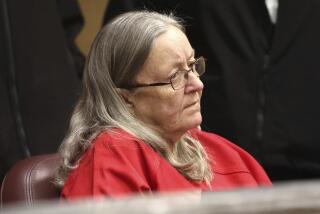Inmate in Texas Sleeping-Lawyer Case Pleads Guilty
A longtime Texas death row inmate whose case became a symbol of problems with the state’s capital punishment system because his lawyer slept through significant portions of the trial agreed to plead guilty to murder Thursday in return for three life sentences.
Attorneys for Calvin J. Burdine, 50, said he was happy that he no longer faced execution, even though he probably will spend the rest of his life behind bars.
“The shocking facts of Mr. Burdine’s sleeping trial attorney awakened the nation to the problem of abysmal representation in capital cases in the death penalty belt of America,” said Robert L. McGlasson, Burdine’s appellate lawyer for 16 years, referring to the fact that Texas has executed far more people than any other state.
The case became a cause celebre in the 2000 presidential election, when then-Texas Gov. George W. Bush -- a staunch supporter of capital punishment -- was asked about “sleeping lawyers” during a debate. Bush defended the state’s procedures.
The case also was cited when Texas legislators passed the Fair Defense Act in 2001, a law mandating that the state establish standards for selecting lawyers to represent defendants in capital cases. In addition, Sen. Patrick J. Leahy (D-Vt.) has referred to Burdine in advocating for federal death penalty reforms.
In August 2001, a federal appeals court ruled that Burdine was entitled to a new trial because there was “fundamental unfairness in [his] capital murder trial created by the consistent unconsciousness of his counsel,” Judge Fortunato P. Benavides wrote, noting that Joe Frank Cannon was “repeatedly asleep” when witnesses testified against his client. “Unconscious counsel equates to no counsel at all.”
Just nine months earlier, Benavides had been the lone dissenter when a smaller panel of the U.S. 5th Circuit Court of Appeals ruled that a defendant in a capital murder trial does not have an absolute constitutional right to have an attorney who stays awake for the entire trial. That decision sparked criticism around the country and negative editorials in most of Texas’ major newspapers. The full court then agreed to rehear the case.
Cannon, who died several years ago, represented a number of defendants in capital cases; 10 of his clients wound up on Texas’ death row -- the second-highest number of any attorney in the state. He slept in at least one other of those cases, and that client has been executed.
At a 1995 hearing, Cannon denied he had slept during Burdine’s 1984 trial. Rather, he said, he was concentrating with his eyes closed. But the court clerk at Burdine’s trial testified that in one instance, Cannon’s head was tilted downward and he was asleep for “at least 10 minutes.” The clerk testified that there were “lots of incidents” when Cannon dozed off for shorter periods.
(Among the 5th Circuit judges who held that the state was entitled to execute Burdine because his attorneys had not proved he was adversely affected by Cannon’s performance were Emilio M. Garza and Edith H. Jones, who have been mentioned as jurists Bush might nominate for the Supreme Court if there is a vacancy during his term.)
The Houston district attorney’s office was preparing to retry Burdine for the 1983 murder of his former roommate, W. T. “Dub” Wise, whose body was found in the bedroom of a trailer with two stab wounds in the back. But another controversy erupted when Harris County District Judge Joan Huffman refused to reappoint McGlasson -- who now heads the capital defense unit at the Atlanta federal public defender’s office -- as Burdine’s attorney.
Negotiations quietly begun to resolve the case led up to Thursday’s announcement in a downtown Houston courtroom. Under the agreement approved by Huffman, Burdine pleaded guilty to Wise’s murder, as well as to aggravated assault with two prior felony convictions and being a felon in possession of a weapon.
Burdine received three consecutive life terms and will not be eligible to come before the Texas Board of Pardons and Paroles until he is 70.
At Thursday’s hearing, Huffman asked Burdine whether he understood what he was agreeing to. “It means we’re going to do a lot of time,” Burdine said, according to his current lawyer, Danalynn Recer.
The plea agreement, said David R. Dow, a University of Houston law professor who has followed the case, “is a recognition by the district attorney’s office of the pivotal importance of who the defendant’s lawyer is on whether someone gets a death sentence.”
Asked why his office decided to forgo another trial in the city that has generated more death sentences than any in the nation, Harris County Dist. Atty. Chuck Rosenthal said it was because there is now a “guarantee that [Burdine] would die in prison.”
More to Read
Sign up for Essential California
The most important California stories and recommendations in your inbox every morning.
You may occasionally receive promotional content from the Los Angeles Times.










